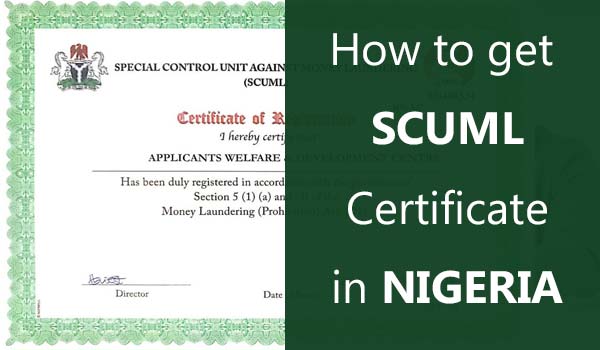HOW TO GET A SCUML CERTIFICATE
A SCUML certificate is the Special Control Unit against Money Laundering (“SCUML”) certificate issued to organizations in compliance with the provisions of the Money Laundering (Prohibition) Act, 2004 which was subsequently repealed and amended to Money Laundering (Prohibition) Act 2011(as amended).
The Money Laundering (Prohibition) Act ML (P) Act and the Prevention of Terrorism Act (PTA) 2011 both require designated non-financial institutions (DNFIs) to have SCUML certificates. When a company applies for this, it is typically granted after the unit has done background research on the company.
WHICH TYPE OF BUSINESS REQUIRES A SCUML CERTIFICATE?
The Regulations states that the Special Control Unit against Money Laundering (“SCUML”) of the Federal Ministry of Industry, Trade and Investment will be responsible for the registration, monitoring and of the activities of Designated Non-Financial Institutions in Nigeria in collaboration with the Nigerian Financial Intelligence Unit (NFIU) and other relevant regulators, professional bodies and self-regulatory organizations.
According to the Regulations, the following businesses and professions exist as Designated non- Financial Institutions for the purpose of registration, reporting, and conduct of customer due diligence:
- business outfits dealing in jewellery;
- car dealers; dealers in luxury goods;
- chartered accountants; audit firms;
- tax consultants; clearing and settlement companies;
- hotels; casinos;
- supermarkets;
- law firms, notaries, and other independent legal practitioners;
- accountants and accounting firms;
- trust and company service providers;
- estate surveyors and valuers;
- mortgage Brokers;
- non-profit organizations;
- dealers in precious stones and metals;
- dealers in real estate, estate developers, estate agents, and brokers;
- hospitality Industry;
- Consultants and Consulting Companies;
- Construction Companies;
- importers and dealers in cars or any other automobiles;
- dealers in mechanized farming equipment and machinery;
- practitioners of mechanized farming;
- Pool betting;
- Lottery businesses including fixed odds, pari-mutuel, sports lottery (betting), scratch card gaming, and other forms of gaming
CONCLUSION
Changing car ownership in Nigeria is more than just handing over keys—it is a legal process that ensures the rightful transfer of responsibility and ownership. Proper documentation is crucial, including the original purchase receipt, proof of ownership, valid roadworthiness certificate, insurance policy, and vehicle registration documents. Without these, a new owner may face legal disputes or difficulties in renewing the vehicle’s papers.
The process typically involves visiting the State Vehicle Licensing Office (VLO) or the Federal Road Safety Corps (FRSC) to officially update records. Additionally, obtaining a notarized sales agreement or affidavit can further validate the transaction, ensuring there are no future claims on the vehicle. Buyers should also confirm that there are no outstanding fines or encumbrances on the car before finalizing the transfer.
As digitalization improves government services, some states now allow online applications for vehicle transfers, making the process more efficient. However, fraudulent practices remain a challenge, with unauthorized agents offering shortcuts that often lead to problems. It is advisable to engage only certified officials or legal professionals to handle the process correctly.
For imported vehicles, clearing documents and custom duty verification are additional steps that cannot be overlooked. The Nigeria Customs Service (NCS) provides platforms to check whether a car has been properly cleared before purchase.
Summarily, successfully transferring car ownership in Nigeria requires diligence, legal compliance, and proper documentation. Buyers and sellers must take necessary precautions to ensure a seamless, fraud-free, and legally binding transaction. By following the correct procedures, vehicle owners can avoid unnecessary fines, disputes, or legal complications in the future. obtaining a SCUML certificate is a strategic necessity for businesses operating in regulated sectors. By ensuring proper documentation, following regulatory guidelines, and staying updated on compliance requirements, businesses can operate legally, avoid penalties, and build a strong financial foundation. As Nigeria strengthens its anti-money laundering framework, businesses that embrace compliance will not only avoid legal risks but also gain a competitive advantage in the market.
NB: This article is not a legal advice, and under no circumstance should you take it as such. All information provided are for general purpose only. For information, please contact chamanlawfirm@gmail.com
WRITTEN BY CHAMAN LAW FIRM TEAM
EMAIL: chamanlawfirm@gmail.com
TEL: 08065553671, 08024230080


